20 start with C start with C
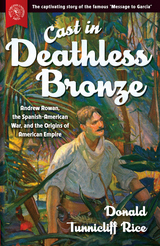
Donald Tunnicliff Rice reveals the facts behind the story of “A Message to García” while using Rowan’s biography as a window into the history of the Spanish-American War, the Philippine War, and the Moro Rebellion. The result is a compellingly written narrative containing many details never before published in any form, and also an accessible perspective on American diplomatic and military history in the late nineteenth and early twentieth centuries.
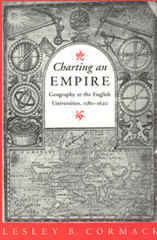
Cormack demonstrates that geography was part of the Arts curriculum between 1580 and 1620, read at university by a broad range of soon-to-be political, economic, and religious leaders. By teaching these young Englishmen to view their country in a global context, and to see England playing a major role on that stage, geography supplied a set of shared assumptions about the feasibility and desirability of an English empire. Thus, the study of geography helped create an ideology of empire that made possible the actual forays of the next century.
Geography emerges in Cormack's account as the fruitful ground between college and court, in whose well-prepared soil the seeds of English imperialism took root. Charting an Empire will interest historians of science, geography, cartography, education, and empire.
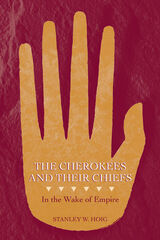
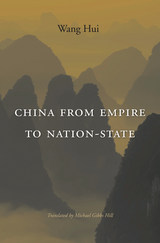
This translation of the Introduction to Wang Hui’s Rise of Modern Chinese Thought (2004) makes part of his four-volume masterwork available to English readers for the first time. A leading public intellectual in China, Wang charts the historical currents that have shaped Chinese modernity from the Song Dynasty to the present day, and along the way challenges the West to rethink some of its most basic assumptions about what it means to be modern.
China from Empire to Nation-State exposes oversimplifications and distortions implicit in Western critiques of Chinese history, which long held that China was culturally resistant to modernization, only able to join the community of modern nations when the Qing Empire finally collapsed in 1912. Noting that Western ideas have failed to take into account the diversity of Chinese experience, Wang recovers important strains of premodern thought. Chinese thinkers theorized politics in ways that do not line up neatly with political thought in the West—for example, the notion of a “Heavenly Principle” that governed everything from the ordering of the cosmos to the structure of society and rationality itself. Often dismissed as evidence of imperial China’s irredeemably backward culture, many Neo-Confucian concepts reemerged in twentieth-century Chinese political discourse, as thinkers and activists from across the ideological spectrum appealed to ancient precedents and principles in support of their political and cultural agendas. Wang thus enables us to see how many aspects of premodern thought contributed to a distinctly Chinese vision of modernity.
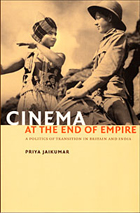
In addition to close readings of British and Indian films of the late colonial era, Jaikumar draws on a wealth of historical and archival material, including parliamentary proceedings, state-sponsored investigations into colonial filmmaking, trade journals, and intra- and intergovernmental memos regarding cinema. Her wide-ranging interpretations of British film policies, British initiatives in colonial film markets, and genres such as the Indian mythological film and the British empire melodrama reveal how popular film styles and controversial film regulations in these politically linked territories reconfigured imperial relations. With its innovative examination of the colonial film archive, this richly illustrated book presents a new way to track historical change through cinema.

Ethel Thomas Herold (1896–1988) was an ordinary person caught up in extraordinary
circumstances—a woman whose sense of patriotic duty took her from small-town Wisconsin to the Philippines in 1922. There, with but a couple of brief interruptions, she would spend the next thirty-seven years, including three in a Japanese internment camp during World War II. In Citizen of Empire, Theresa Kaminski uses Ethel’s experiences of war and imperialism to explore a unique example of how those enormous forces helped shape Americans’ notions of citizenship and patriotism in the first half of the twentieth century.
As Kaminski’s absorbing narrative reveals, Ethel’s views of active patriotism began to form early on when her oldest brother became a schoolteacher in the Philippines in 1901 at the end of the Spanish-American War. After college and marriage, Ethel and her husband Elmer Herold went to the islands to teach in the public schools—a way, in her view, of spreading American ideals abroad. She quit teaching in 1927 to start a family but continued to support U.S. imperialism through her colonial household and club work. Her comfortable expatriate life fell apart, however, when the Japanese attacked the Philippines in 1941: the colonial elite were now powerless prisoners. After the war, wishing to help the people who had supported them during the occupation, Ethel and Elmer Herold stayed in the islands, but after Philippine independence came in 1946, they increasingly found themselves strangers in a place they had long called home. In 1959 the couple returned to Wisconsin, where Ethel remained politically active and saw the solution
to America’s Cold War problems in the conservative wing of the Republican Party.
Ethel Thomas Herold was a woman of forceful personality. Marked most notably by her strongly held views on patriotism and citizenship, her transpacific life offers a remarkable
instance of how the personal and political came together during the “American century.”
Theresa Kaminski is professor of history at the University of Wisconsin–Stevens Point and the author of Prisoners in Paradise: American Women in the Wartime South Pacific.
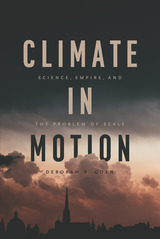
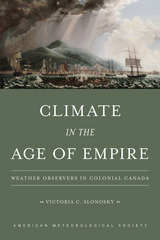
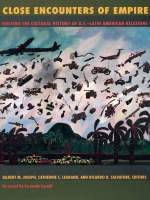
Exploring a variety of nineteenth- and twentieth-century encounters in Latin America, these theoretically engaged essays by distinguished U.S. and Latin American historians and anthropologists illuminate a wide range of subjects. From the Rockefeller Foundation’s public health initiatives in Central America to the visual regimes of film, art, and advertisements; these essays grapple with new ways of conceptualizing public and private spheres of empire. As such, Close Encounters of Empire initiates a dialogue between postcolonial studies and the long-standing scholarship on colonialism and imperialism in the Americas as it rethinks the cultural dimensions of nationalism and development.
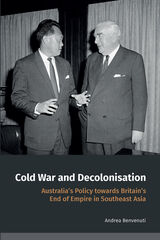
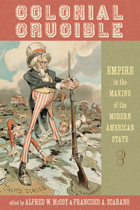
Moving well beyond theory, this volume takes the next step, adding a fine-grained, empirical texture to the study of U.S. imperialism by analyzing its specific consequences. Across a broad range of institutions—policing and prisons, education, race relations, public health, law, the military, and environmental management—this formative experience left a lasting institutional imprint. With each essay distilling years, sometimes decades, of scholarship into a concise argument, Colonial Crucible reveals the roots of a legacy evident, most recently, in Washington’s misadventures in the Middle East.
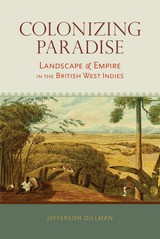
In Colonizing Paradise, historian Jefferson Dillman charts the broad spectrum of sentiments that British citizens and travelers held regarding their colonial possessions in the West Indies. Myriad fine degrees of ambivalence separated extreme views of the region as an idyllic archipelago or a nest of Satanic entrapments. Dillman shows the manner in which these authentic or spontaneous depictions of the environment were shaped to form a narrative that undergirded Britain’s economic and political aims in the region.
Because British sentiments in the Caribbean located danger and evil not just in indigenous populations but in Spanish Catholics as well, Dillman’s work begins with the arrival of Spanish explorers and conquistadors. Colonizing Paradise spans the arrival of English ships and continues through the early nineteenth century and the colonial era. Dillman shows how colonial entrepreneurs, travelers, and settlers engaged in a disquieted dialogue with the landscape itself, a dialogue the examination of which sheds fresh light on the culture of the Anglophone colonial Caribbean.
Of particular note are the numerous mythical, metaphorical, and biblical lenses through which Caribbean landscapes were viewed, from early views of the Caribbean landscape as a New World paradise to later depictions of the landscape as a battleground between the forces of Christ and Satan. The ideal of an Edenic landscape persisted, but largely, Dillman argues, as one that needed to be wrested from the forces of darkness, principally through the work of colonization, planting, cataloguing, and a rational ordering of the environment.
Ultimately, although planters and their allies continued to promote pastoral and picturesque views of the Caribbean landscape, the goal of such narratives was to rationalize British rule as well as to mask and obscure emerging West Indian problems such as diseases, slavery, and rebellions. Colonizing Paradise offers much to readers interested in Caribbean, British, and colonial history.
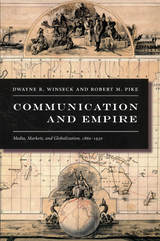
Drawing on extensive research in corporate and government archives, Winseck and Pike illuminate the actions of companies and cartels during the late nineteenth century and early twentieth, in many different parts of the globe, including Africa, Asia, and Central and South America as well as Europe and North America. The complex history they relate shows how cable companies exploited or transcended national policies in the creation of the global cable network, how private corporations and government agencies interacted, and how individual reformers fought to eliminate cartels and harmonize the regulation of world communications. In Communication and Empire, the multinational conglomerates, regulations, and the politics of imperialism and anti-imperialism as well as the cries for reform of the late nineteenth century and early twentieth emerge as the obvious forerunners of today’s global media.
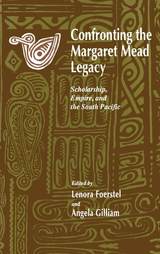
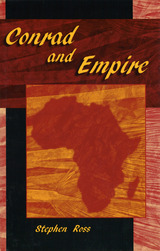
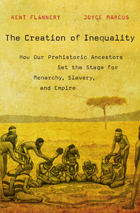
Our early ancestors lived in small groups and worked actively to preserve social equality. As they created larger societies, however, inequality rose, and by 2500 bce truly egalitarian societies were on the wane. In The Creation of Inequality, Kent Flannery and Joyce Marcus demonstrate that this development was not simply the result of population increase, food surplus, or the accumulation of valuables. Instead, inequality resulted from conscious manipulation of the unique social logic that lies at the core of every human group.
A few societies allowed talented and ambitious individuals to rise in prestige while still preventing them from becoming a hereditary elite. But many others made high rank hereditary, by manipulating debts, genealogies, and sacred lore. At certain moments in history, intense competition among leaders of high rank gave rise to despotic kingdoms and empires in the Near East, Egypt, Africa, Mexico, Peru, and the Pacific.
Drawing on their vast knowledge of both living and prehistoric social groups, Flannery and Marcus describe the changes in logic that create larger and more hierarchical societies, and they argue persuasively that many kinds of inequality can be overcome by reversing these changes, rather than by violence.

Imperial Nations advance their own interests by exploiting other societies. To those on the receiving end this is obvious, while inside the empire, a powerful ideological system of justification tends to hide all but the worst excess.
Carl Boggs argues that that the US began life two centuries ago as a nascent colonialist regime plundering and conquering the Native Tribes. The Indian wars were followed by perpetual militarism and warfare fuelled by a deep sense of national exceptionalism. The Crimes Of Empire examines several trends in this process, and illustrates the new depths plumbed since 9/11.
Violation of international agreements, treaties and laws and the use of prohibited weapons, support for death squads and torture are just some of the practices that Boggs highlights as he shows how technical superiority and media control prolong the American nightmare.
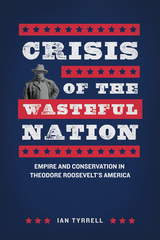
In Crisis of the Wasteful Nation, Ian Tyrrell gives us a cohesive picture of Roosevelt’s engagement with the natural world along with a compelling portrait of how Americans used, wasted, and worried about natural resources in a time of burgeoning empire. Countering traditional narratives that cast conservation as a purely domestic issue, Tyrrell shows that the movement had global significance, playing a key role in domestic security and in defining American interests around the world. Tyrrell goes beyond Roosevelt to encompass other conservation advocates and policy makers, particularly those engaged with shaping the nation’s economic and social policies—policies built on an understanding of the importance of crucial natural resources. Crisis of the Wasteful Nation is a sweeping transnational work that blends environmental, economic, and imperial history into a cohesive tale of America’s fraught relationships with raw materials, other countries, and the animal kingdom.
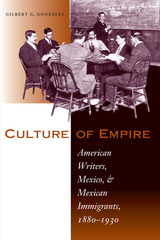
A history of the Chicano community cannot be complete without taking into account the United States' domination of the Mexican economy beginning in the late nineteenth and early twentieth centuries, writes Gilbert G. González. For that economic conquest inspired U.S. writers to create a "culture of empire" that legitimated American dominance by portraying Mexicans and Mexican immigrants as childlike "peons" in need of foreign tutelage, incapable of modernizing without Americanizing, that is, submitting to the control of U.S. capital. So powerful was and is the culture of empire that its messages about Mexicans shaped U.S. public policy, particularly in education, throughout the twentieth century and even into the twenty-first.
In this stimulating history, Gilbert G. González traces the development of the culture of empire and its effects on U.S. attitudes and policies toward Mexican immigrants. Following a discussion of the United States' economic conquest of the Mexican economy, González examines several hundred pieces of writing by American missionaries, diplomats, business people, journalists, academics, travelers, and others who together created the stereotype of the Mexican peon and the perception of a "Mexican problem." He then fully and insightfully discusses how this misinformation has shaped decades of U.S. public policy toward Mexican immigrants and the Chicano (now Latino) community, especially in terms of the way university training of school superintendents, teachers, and counselors drew on this literature in forming the educational practices that have long been applied to the Mexican immigrant community.
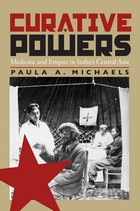
Finalist, PEN Center USA Literary Awards, Research Nonfiction
Rich in oil and strategically located between Russia and China, Kazakhstan is one of the most economically and geopolitically important of the so-called Newly Independent States that emerged after the USSR's collapse. Yet little is known in the West about the region's turbulent history under Soviet rule, particularly how the regime asserted colonial dominion over the Kazakhs and other ethnic minorities.
Grappling directly with the issue of Soviet colonialism, Curative Powers offers an in-depth exploration of this dramatic, bloody, and transformative era in Kazakhstan's history. Paula Michaels reconstructs the Soviet government's use of medical and public health policies to change the society, politics, and culture of its outlying regions. At first glance the Soviets' drive to modernize medicine in Kazakhstan seems an altruistic effort to improve quality of life. Yet, as Michaels reveals, beneath the surface lies a story of power, legitimacy, and control. The Communist regime used biomedicine to reshape the function, self-perception, and practices of both doctors and patients, just as it did through education, the arts, the military, the family, and other institutions.
Paying particular attention to the Kazakhs' ethnomedical customs, Soviet authorities designed public health initiatives to teach the local populace that their traditional medical practices were backward, even dangerous, and that they themselves were dirty and diseased. Through poster art, newsreels, public speeches, and other forms of propaganda, Communist authorities used the power of language to demonstrate Soviet might and undermine the power of local ethnomedical practitioners, while moving the region toward what the Soviet state defined as civilization and political enlightenment.
As Michaels demonstrates, Kazakhs responded in unexpected ways to the institutionalization of this new pan-Soviet culture. Ethnomedical customs surreptitiously lived on, despite direct, sometimes violent, attacks by state authorities. While Communist officials hoped to exterminate all remnants of traditional healing practices, Michaels points to evidence that suggests the Kazakhs continued to rely on ethnomedicine even as they were utilizing the services of biomedical doctors, nurses, and midwives. The picture that ultimately emerges is much different from what the Soviets must have imagined. The disparate medical systems were not in open conflict, but instead both indigenous and alien practices worked side by side, becoming integrated into daily life.
Combining colonial and postcolonial theory with intensive archival and ethnographic research, Curative Powers offers a detailed view of Soviet medical initiatives and their underlying political and social implications and impact on Kazakh society. Michaels also endeavors to link biomedical policies and practices to broader questions of pan-Soviet identity formation and colonial control in the non-Russian periphery.
READERS
Browse our collection.
PUBLISHERS
See BiblioVault's publisher services.
STUDENT SERVICES
Files for college accessibility offices.
UChicago Accessibility Resources
home | accessibility | search | about | contact us
BiblioVault ® 2001 - 2024
The University of Chicago Press









